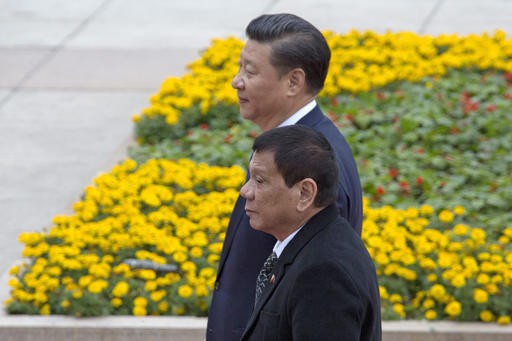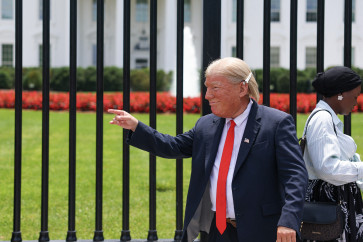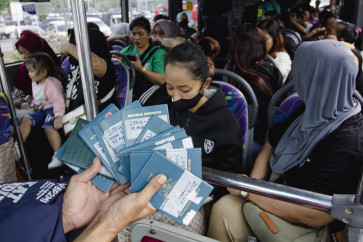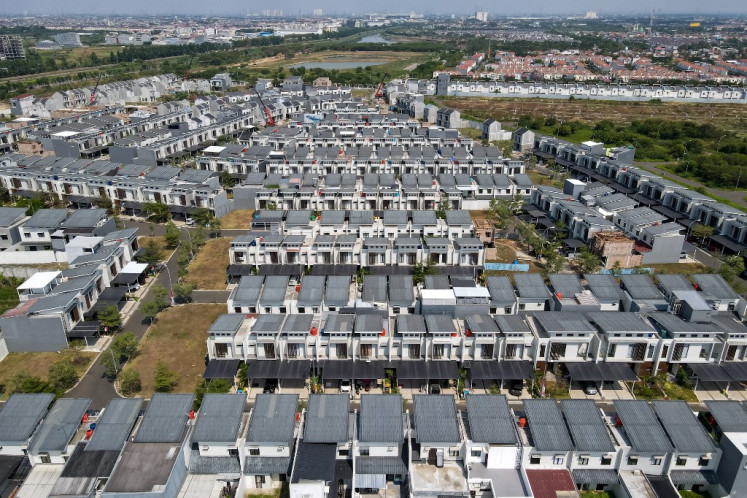Popular Reads
Top Results
Can't find what you're looking for?
View all search resultsPopular Reads
Top Results
Can't find what you're looking for?
View all search resultsBeijing under no illusion Manila will pivot away from Washington
Change text size
Gift Premium Articles
to Anyone
 Philippine President Rodrigo Duterte (front) walks with Chinese President Xi Jinping during a welcome ceremony outside the Great Hall of the People in Beijing, China, Oct. 20, 2016. (AP/Ng Han Guan)
Philippine President Rodrigo Duterte (front) walks with Chinese President Xi Jinping during a welcome ceremony outside the Great Hall of the People in Beijing, China, Oct. 20, 2016. (AP/Ng Han Guan)
C
hinese media and officials are silent on Philippine President Duterte's effusive praise of China and his remarks on "separation from the US."
While Beijing has laid out the red carpet for Rodrigo Duterte this week, and returned the embrace of the Philippine President, it is under no illusion that Manila will pivot away from Washington.
China may stand to gain if Duterte breaks away from the US in geopolitical terms, as he said he would on Thursday. But it is fully aware that he does not decide on the Philippines' foreign policy on his own and will have to go through the political processes domestically, Chinese analysts have said.
During his four-day stay in Beijing, Duterte took every opportunity to assert his anti-West stance, especially towards the US.
The 71-year-old leader went as far as to proclaim his "separation from the United States" in both military and economic terms at a business forum in Beijing on Thursday. He showered praise on the country and its people, and announced that "Duterte of the Philippines is veering towards China because China has the character of an Oriental. It does not go around insulting people."
While Beijing laid out full honours for Duterte, in a reception seldom accorded to regional leaders, Chinese media and officials have been silent on his effusive praise of the Chinese and his declaration of separation from the US.
Chinese netizens, displaying some scepticism, said he was making these remarks to extract benefits from China, such as soft loans.
Some likened his "separation" from the US to a new social phenomenon in China in which people make use of fake divorces to get around restrictive regulations in order to obtain a second housing loan.
Professor Li Kaisheng from the Shanghai Academy of Social Sciences noted that while Duterte wishes to separate from the US, what it really means is unclear. "This is not the first time Duterte has said this, and it merely represents what he really feels." But it is hard to say if this will be translated into actual policies, he said.
"On the one hand, it may be good for Beijing given that the US has been using the Philippines to contain China in the region," said Li.
On the flip side, if Duterte gets toppled as a result of soured US-Philippine ties, Beijing may stand to lose even more given that Sino-Philippine relations are only starting to improve, he added.
Noting that there had been no reaction from Chinese officials so far to Duterte's remarks, he said he did not expect them to respond.
Beijing-based analyst Zha Wen said China does not expect Manila to break its long-time alliance with Washington. "We should not take a zero-sum view on these relationships," said Zha from the China Foreign Affairs University.
What Beijing wants is for bilateral relations to improve and for Manila to conduct a more balanced foreign policy, she added.
Concurring with Zha, Li said the agreements and loans signed should not be viewed as carrots to support Manila's break from Washington.
Beijing has responded to Duterte's friendly overtures with a lavish welcome that shows a high level of goodwill and respect.
Notably, he was given access to four of the seven members of the powerful Politburo Standing Committee: President Xi Jinping, Premier Li Keqiang, top legislator Zhang Dejiang and top-ranking Vice-Premier Zhang Gaoli. In return, Beijing has achieved its goal of diffusing tensions in the South China Sea by reaching an agreement with Manila to resume bilateral talks on their territorial disputes.
This could signal to other countries that in handling conflicts with China, it is best to put aside disputes and focus on cooperation, said Xu Liping, an Asean researcher with the Chinese Academy of Social Sciences. "It is unrealistic to expect China to compromise, and as a big country, it has the ability to give you a lot of benefits," he added.
This article appeared on The Straits Times newspaper website, which is a member of Asia News Network and a media partner of The Jakarta Post






